
From Commune to Capitalism
from COMMUNE to CAPITALISM
How Chinas Peasants Lost Collective Farming and Gained Urban Poverty
by ZHUN XU

MONTHLY REVIEW PRESS
New York
Copyright 2018 by Zhun Xu
All Rights Reserved
Library of Congress Cataloging-in-Publication Data: available from the publisher
ISBN: 978-158367-6981 paper
ISBN: 978-158367-6998 cloth
Typeset in Minion Pro
Monthly Review Press, New York
monthlyreview.org
5 4 3 2 1
Contents
Preface
I first came across the history of collectives and decollectivization in high school. My history textbook criticized the collectives and communes and praised decollectivization without any reservation. The illustrated post-collective peasants were dancing happily on the book. As I recall, I found the narrative and illustration in the textbook very persuasive. After all, thanks to decollectivization, we have all got enough rice to eat, right? My college major in economics later reinforced this view by providing a few jargon phrases. I believed that the Maoist period was an unfortunate disaster and, due to insufficient individual incentives under the collectives or other publicly owned enterprises, people at that time were lazy. So decollectivization and all the subsequent privatization reforms in China must have done great service to the working people.
It wasnt until later, when I had a chance to talk to relatives and friends who had spent their lives on a farm, that I began to doubt this view. None of them seemed enthusiastic about decollectivization. When I asked them, Did you shirk under the collectives? they would always say, No, we worked day and night. I also noticed that in my very agricultural hometown, all the major infrastructure was built in the Maoist period, including a huge dam and big bridges. By contrast, no such projects were ever undertaken in the post-Mao era. It is clear to me that the gap between urban and rural and rich and poor is increasing. The villages are losing their vigor and the peasants are obviously not doing that well. My optimism about decollectivization and other neoliberal reforms has gradually shattered.
After college I came to the United States to pursue a PhD in economics at the University of Massachusetts Amherst. At the same time, I started reading many writings of Mao Zedong, as well as many other radical works on China. I was not alone. Quite a few graduate students at UMass Amherst were very interested in studying Chinas past and present from a revolutionary point of view. We had intense weekly discussions based on a wide range of Marxist writings. Zhaochang Peng, another graduate student, introduced me to several books by William Hinton, including Fanshen, Shenfan, and The Great Reversal. These books provided invaluable insights and inspired me to study the dramatic history of agrarian change in China.
During those discussions, I decided to write a dissertation on Chinas agrarian change, believing that it would be useful in the struggle for a better society. In China, the story of decollectivization is being employed as a strong ideological weapon to defend privatization and the free market. As soon as the issue of socialism and collective agriculture is raised, some people simply say, Weve done that and it failed. That is why we had decollectivization. For Marxists and socialists in China, it has become necessary to debunk the myth around collectives and decollectivization before they can convey their radical visions of a new society. I hope this book will contribute to those debates and struggles.
Many people provided immense help when I was working on this book, which is largely based on my PhD dissertation. David Kotz, Mwangi wa Githinji, Deepankar Basu, and Sigrid Schmalzer were on my dissertation committee and gave me numerous comments and suggestions. Over the past decade, I have also benefited from my many discussions with Ying Chen, Zhongjin Li, Shuang Wu, Kai Yu, Zixu Liu, Li Gu, Zhaochang Peng, Minqi Li, Hao Qi, An Li, Zoe Sherman, Chen Zhang, Rod Green, and my parents. I would also like to thank all my students and colleagues in China and the United States who have provided much feedback over the years. Many friends and relatives in my hometown have generously helped with my fieldwork. Last but not least, I would like to thank Michael Yates and Martha Cameron for their careful editing.
Much of this book has appeared in article form in several journals. is based on The Achievements, Contradictions and Demise of the Rural Collectives in Songzi County, China, Development and Change 46, no. 2 (2015): 339365. I would like to thank the editors and publishers of these journals for their permission to publish slightly revised versions of the papers here.
 1
1 
Socialism and Capitalism in the Chinese Countryside
T he nearly seventy-year history of the Peoples Republic of China can be roughly divided into two periods: during the first thirty years the PRC mainly followed the socialist path, but in the last four decades China has gradually become a champion of capitalism. As the Chinese maxim says, Thirtyyears east and then thirty years west, meaning there is no eternity of ideas, powers, and social relations. The differences between the two eras are more than clear to the Chinese people. In 1949, Mao Zedong, the founder of the republic, proudly announced,The Chinese people have stood up! But nowadays, folk wisdom laments,Work hard for decades, go back to the time before liberation in one night! Every single aspect of social relations in China is marked by the retrogression from state socialism to capitalism. Everything has seen a great reversal. Red becomes black, noble becomes vulgarand revolutionary becomes reactionary.
This book investigates some of these changes as they have affected land use and agriculture. In the 1950s, the PRC implemented a program of massive land reform and redistribution. The resulting collectives and peoples communes worked for more than twenty years and made significant contributions to the countrys economic development and to the education and health care of hundreds of millions of people.
In the early 1980s, however, the Chinese Communist Party (CCP) undid much of the previous reform and dismantled the rural collectives, turning them into atomized peasant households while maintaining collective ownership of the land on paper. At the same time, academia and the mainstream media started condemning collective agriculture and praising the post-collective small-producer agricultureformally called the house responsibility system, or HRSas an alternative to collectives and capitalist farms. The actual performance of HRS, however, has been mediocre at best. Rural health care and education have clearly deteriorated as a consequence of decollectivization. Gains in agricultural production since the 1980s have been rather limited, and the gap between the urban and rural economies has become much larger than it was thirty years ago. Recent evidence also suggests that land consolidation and capitalist farms have developed rapidly in recent years, with the open endorsement of the CCP itself.
Agrarian relations in China seem to have come full circle in just a few decades. The obvious question is, why? What historical forces led to a rapid decollectivization and a gradual path to capitalist agriculture after twenty years of collectives?
Next page
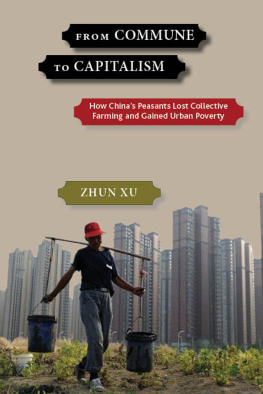

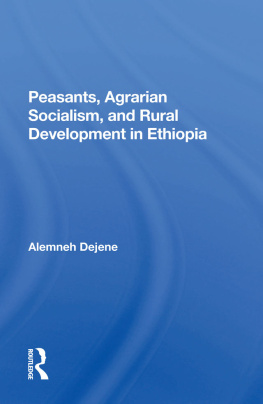
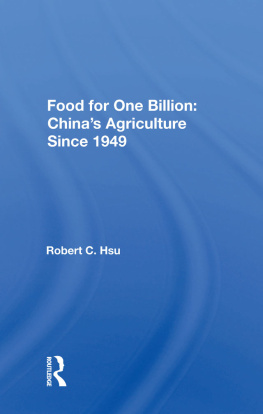

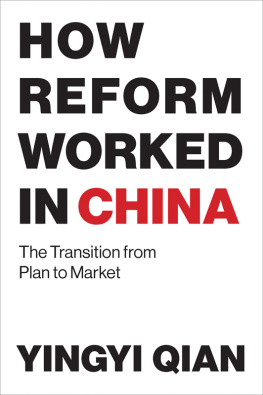
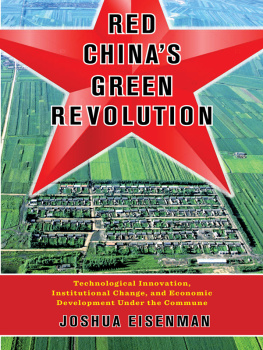


 1
1